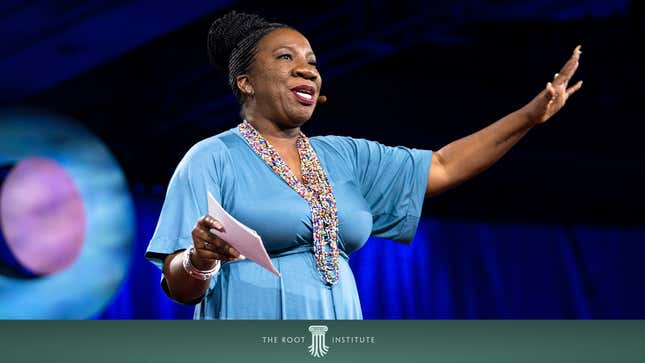
Tarana Burke knows better than most the power of a hashtag. After all, hers—#MeToo—turned into a zeitgeist moment back in the fall of 2017, as Hollywood actresses began using it on social media in response to the mounting allegations against Harvey Weinstein. Black Twitter quickly rose to correct the oversight of the tag’s originator Burke, who then assumed her rightful place at the fore of a long-overdue mass movement focused on reckoning with sexual violence.
In the nearly three years since, Burke has traveled the globe speaking and educating, and has turned Me Too into a full-fledged organization, a necessity when considering how to maintain the focus of the movement’s mission amid so many influences and interests. As the 2018 Root 100 honoree told me, Managing Editor of The Glow Up Maiysha Kai, during a one-on-one discussion for our first-ever Root Institute, two of the first people she consulted when she unexpectedly found herself thrust into the public eye were fellow activists and co-founders of the Black Lives Matter hashtag and movement, Alicia Garza and Patrice Cullors.
“Because this phenomenon is new,” she noted, pointing out how social media has changed not only the way we recognize movements but movement leaders in this century. “Now, this idea that you can be catapulted to global fame overnight—literally—it’s a small kind of select club of folks, and so there’s not a lot of people with answers on how to deal with it.”
Garza and Cullors—along with co-founder Opal Tometi—have no doubt been experiencing some surreality of their own in recent months. The movement they started with a hashtag in 2013—which was mistakenly compared to domestic terrorist movements until very recently—has become a global rallying cry since the killing of George Floyd in May of this year. The sea change in the perception of Black Lives Matter has been stunning, if bittersweet, and to Burke, it has also been a testament to our commitment, especially amid the concurrent threat of COVID-19.
“I think this moment demands a lot of things that we have not been accustomed to before, but one thing that we are accustomed to is tenacity—and resilience,” she said during our conversation, which will air this afternoon. “Our folks figure out [how to] make a way, recreate, create new when we have to. And so, I think that that’s what we’ve seen in this moment; but it also requires us to not stop.”
Please join us for this conversation and more—Sign up today!

